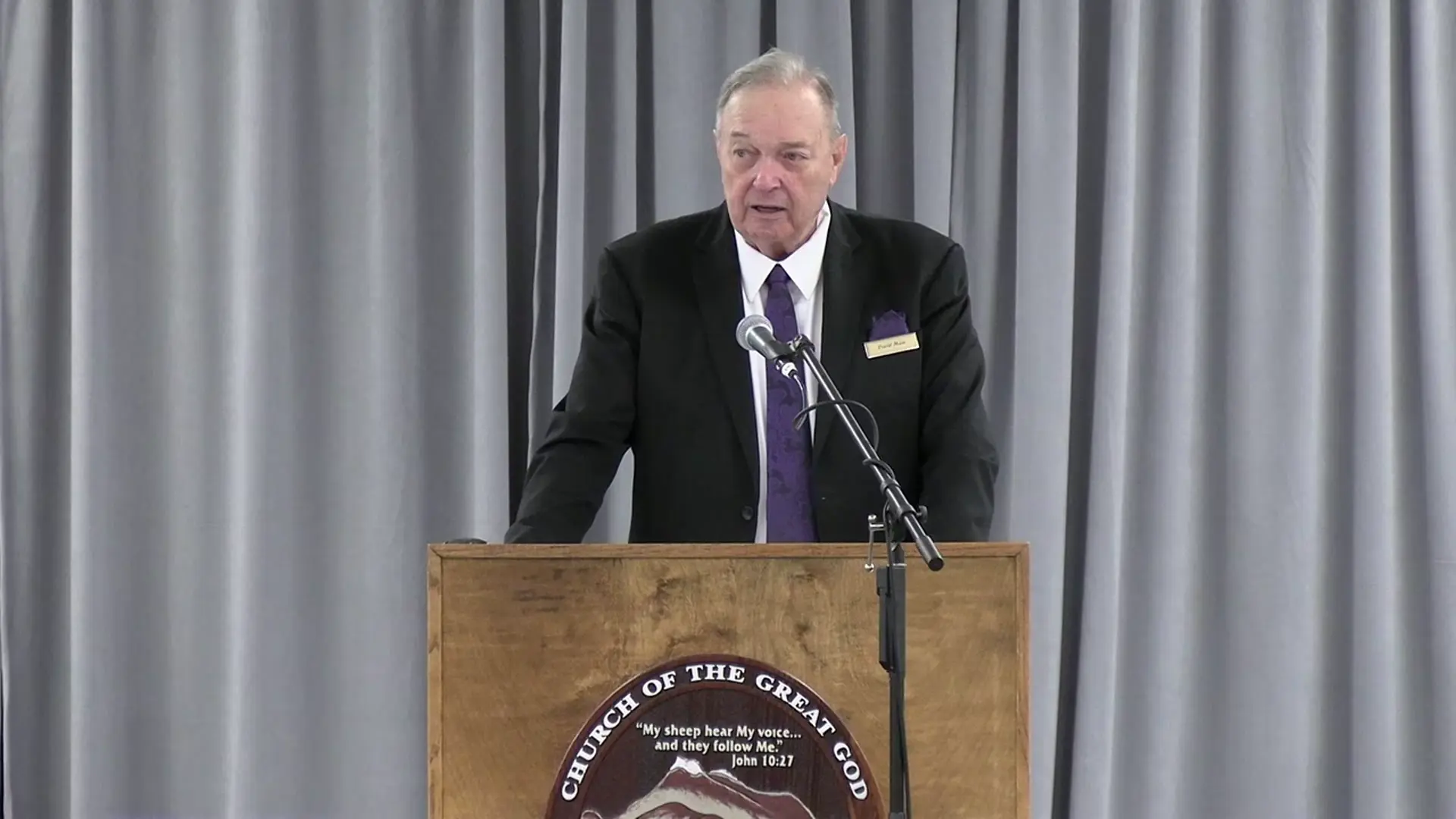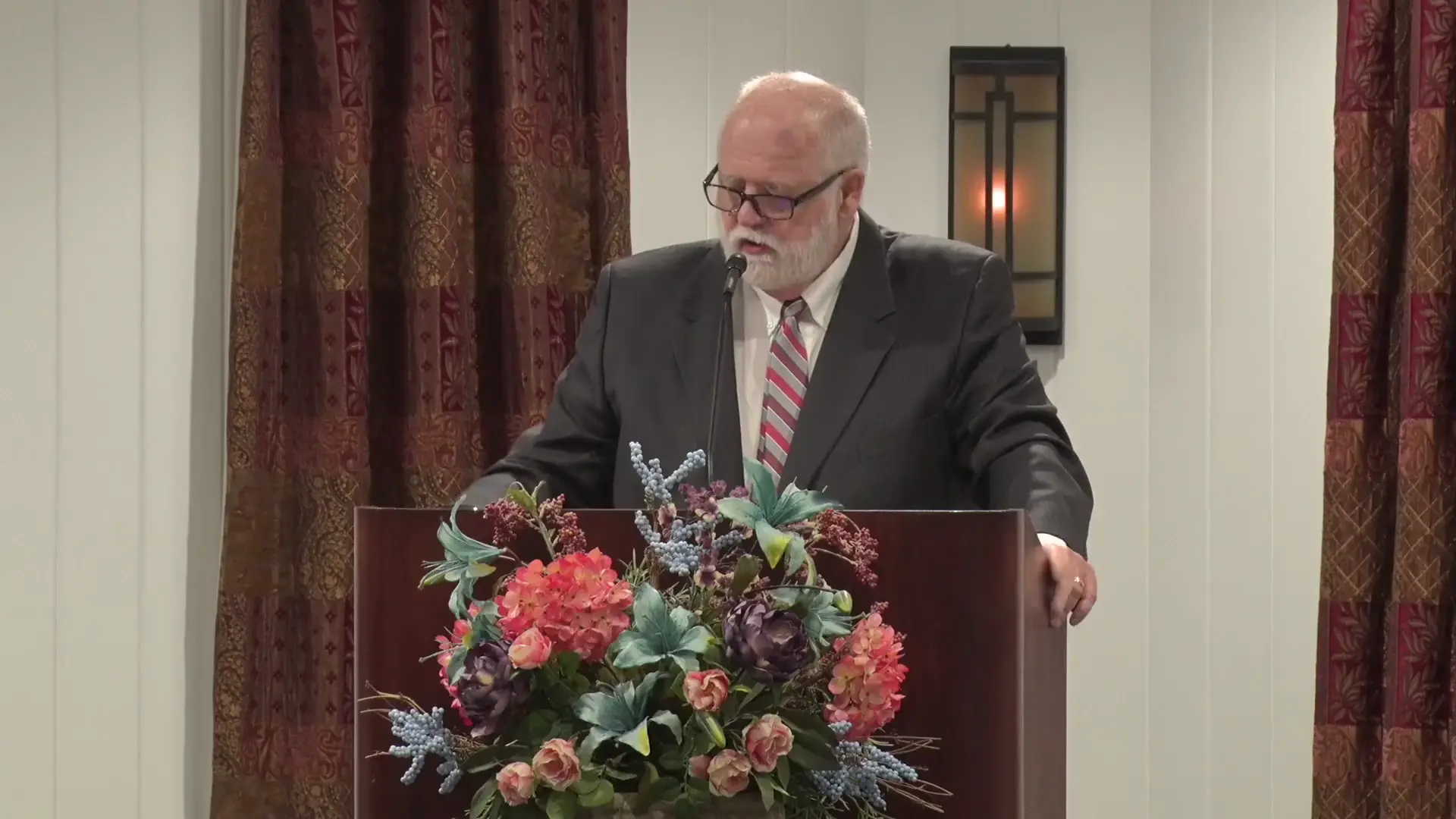Sabbath - Sermons, Bible Studies, Articles, and Essays
God's Sabbath
Bible Study by Richard T. RitenbaughThe fourth commandment is to remember the Sabbath day and keep it holy. The seventh-day Sabbath is more than a day of rest; it is a day devoted entirely to God, serving as a regulator and barometer of our relationship with Him. The Sabbath was made by God on the seventh day of Creation, as described in Genesis 2:2-3, and it is inte
The Purpose of the Sabbath
Sermonette by Craig SablichThe Sabbath enables us to learn spiritual principles rather than a set of rules, and to exercise righteous judgment, aligning our actions with God's purpose.
Did God Change the Sign From the Sabbath to the Holy Spirit?
Sermonette by David C. GrabbeA common idea is that the Sabbath is the sign of the Old Covenant, but the Holy Spirit is the sign of the New. Yet the seventh day has been holy since creation.
Remember the Sabbath Day
Sermonette by Hunter D. SwansonAll of God's people have at times felt overwhelmed by grief and exhaustion, needing a genuine rehabilitative rest. The Sabbath restores spiritual strength.
The Sabbath: Creation
Feast of Tabernacles Sermon by Richard T. RitenbaughThe Sabbath plays a vital role in God's continuing creation of His sons and daughters, as it is a day set apart for spiritual work and growth. God did not merely rest after the creation week; He continues to work, and this is exemplified in the weekly Sabbath meetings with His people. The Sabbath, as described in Leviticus 23, is a
The Fourth Commandment (Part Two): Christ's Attitude Toward the Sabbath
'Personal' from John W. RitenbaughNowhere in the Bible is the Sabbath annulled by a command or example of Jesus Christ or the apostles. In the gospels, the controversy surrounding the Sabbath is always about how to keep it, not whether to keep it. Jesus never declares that it no longer matters or that we need not observe it. He obviously kept the Sabbath, as eviden
Sabbathkeeping (Part 4)
Sermon by John W. RitenbaughThe Sabbath holds a significant place in God's purpose for mankind, reflecting its importance to each of us. It is not merely a day for worship, but a specific day designated by God, for no other day will suffice. God, in His sovereignty, has the right to set such commands, and our role is to submit, recognizing that deviations fro
Sabbathkeeping (Part 2)
Sermon by John W. RitenbaughIt is from the proper use of the Sabbath—in fellowshipping with Him and getting to know Him—that we derive true spiritual rest and refreshment.

Polluted Sabbath?
Sermon by Bill OnisickPolluting and profaning God's Sabbath means to allow the distractions of the world to prevent us from calling the holy Sabbath a delight.
The Fourth Commandment
Bible Study by Martin G. CollinsThe Sabbath is foundational to a healthy relationship with God. It is special, holy day of rest and time to reconnect with our Creator.
Sabbathkeeping (Part 1)
Sermon by John W. RitenbaughHow and why a person keeps the Sabbath determines whether this test commandment is really a sign between God and His people or an act of futility.
The Lunar Sabbath or the Seventh-Day Sabbath: Which?
'Ready Answer' by Charles WhitakerThe recent Lunar Sabbath phenomenon is unbiblical and unworkable. The weekly Sabbath, observed every seventh day, is correct and in line with God's Word.
Sabbathkeeping (Part 3)
Sermon by John W. RitenbaughThe biblical instructions for Sabbath keeping apply far more to the church than to the Israelites, who did not have the fullness of scriptural counsel.

Are the Sabbath and Holy Days Done Away?
'Ready Answer' by Earl L. HennTo justify not keeping the Sabbath and holy days, many use Colossians 2:16-17 as proof that Paul did not command it. The truth is just the opposite!
Remember the Sabbath Day
CGG Weekly by Richard T. RitenbaughThe command implies that if we remember the Sabbath day properly—that is, with godly understanding—then our only appropriate response is to keep it holy.
The Sabbath: Rest
Feast of Tabernacles Sermon by Richard T. RitenbaughThe Sabbath is an antidote to the weariness we experience. It recalls God's pausing after completing His physical creation, focusing on the spiritual creation.
The Sabbath: Redemption
Feast of Tabernacles Sermon by Richard T. RitenbaughGod has blessed us with the Sabbath, a period of holy time, when He redeems us from the clutches of our carnality and this evil world.
The Day God Rested
Sermonette by Ryan McClureGod gave the Sabbath as a blessing for man, which, if kept correctly, gives rejuvenating rest, a relief from stress, and a defense against illness.
Rome's Challenge (Part 1)
Article by StaffThe Catholic Church admits to changing the day of worship from Sabbath to Sunday. Protestants who keep Sunday are bowing to presumed Catholic authority.
Roman Catholic and Protestant Confessions About Sunday
Article by StaffIt is generally known and freely admitted that early Christians observed the seventh day as the Sabbath, and that mere men changed God's times and laws.
Rome's Challenge (Part 2)
Article by StaffProtestantism recognizes no rule of faith except the Bible, yet the Bible nowhere gives Protestantism the authority to change the day of worship to Sunday.
The Signs of God (Part Two)
CGG Weekly by David C. GrabbeCorrect actions become a sign—a witness—even without any preaching, which is why God's words are symbolically bound to the hand rather than the tongue.
Manna and the Preparation Day (Part Two)
CGG Weekly by David C. GrabbeThe Preparation Day is a day of 'gathering' what relates to eternity so that we can properly ingest the spiritual manna on the holy day without distraction.
Has Time Been Lost?
Herbert W. Armstrong BookletHow can we know which day is the true seventh day God blessed and made holy? Has time been lost? Were not ten days dropped out of it at one time?
The Fourth Commandment (Part One) (1997)
'Personal' from John W. RitenbaughMost people think the fourth commandment is least important, but it may be one of the most important! It is a major facet of our relationship with God.
It's Not Our Time
Article by David C. GrabbeWe live in a society that is increasingly concerned about ownership. Yet who owns the Sabbath? How does the answer to this question affect our keeping of it?

Simplifying Life (Part Five)
Feast of Tabernacles Sermon by David F. MaasThe seventh-day Sabbath is God's design for rest, sanctification, and restoration, both today and for the entire creation in the Kingdom of God.

Holy Ground
Sermon by Ted E. BowlingThe principle of sanctification applies to time as well as place, as God sanctified the seventh day Sabbath as a covenant sign between Him and His people.
Did Christ's Resurrection Change the Day of Worship? (Part One)
CGG Weekly by David C. GrabbeProtestants will not concede Papal authority. Instead, they justify Sunday-worship by saying they are honoring the day on which Christ rose from the dead.
Skipping Services? Consider Carefully
CGG Weekly by Richard T. RitenbaughGod's word marks the Sabbath as a time of His calling His people together for worship, so attending church services is a vital part of the Christian Sabbath.
The Commandments (Part Seven)
Sermon/Bible Study by John W. RitenbaughThe work required on the Sabbath is to prepare for the Kingdom of God, fellowshipping with our brethren, serving where possible, and relieving burdens.
The Commandments (Part Five)
Sermon/Bible Study by John W. RitenbaughThe Sabbath is a period of time God purposefully sanctified and set apart for the benefit of mankind, a time dedicated to God's spiritual creation.
The Commandments (Part Six)
Sermon/Bible Study by John W. RitenbaughGod gave the Sabbath to His people so they can know Him intimately. Idolatry, scattering, and captivity are the natural consequences of Sabbath-breaking.

Strategies for Interfacing with Babylon without Becoming Assimilated (Part Four)
Feast of Tabernacles Sermon by David F. MaasOver 77% of 'Christian' churches have chosen the day of the sun as their day of rest, rejecting the day God hallowed from creation, seen in the 4th Commandment.
The Fourth Commandment
'Personal' from John W. RitenbaughAt creation, God sanctified only one day, the seventh, as a day of rest. At Sinai, He again sanctified it as a holy day, tying it to creation and freedom.
The Fourth Commandment (Part 2)
Sermon by John W. RitenbaughThe Sabbath reminds us that God is Creator and that we were once in slavery to sin. The Sabbath is a time of blessing, deliverance, liberty, and redemption.
The Fourth Commandment (Part 1)
Sermon by John W. RitenbaughThe Sabbath is a special creation, a very specific period of holy time given to all of mankind, reminding us that God created and is continuing to create.
Is It Salvational? (Part One)
CGG Weekly by David C. GrabbeWhether a matter is salvational is the wrong question. There is a better question and another approach to evaluating matters that will put us on better footing.
The Fourth Commandment: Idolatry
Sermon by John W. RitenbaughGod, not man, created, sanctified and memorialized the seventh day Sabbath from the time of creation, intending that man use this holy time to worship God.
The Fourth Commandment (Part 3)
Sermon by John W. RitenbaughJesus magnified the Sabbath, giving principles by which to judge our activities. Each time Jesus taught about the Sabbath, He emphasized some form of redemption.
Did Christ's Resurrection Change the Day of Worship? (Part Two)
CGG Weekly by David C. GrabbeThe timing of Jesus Christ's resurrection has nothing to do with establishing which day God made holy, and everything to do with whether He is the Messiah.
Leadership and Covenants (Part Five)
'Personal' from John W. RitenbaughUniversal in scope, the Edenic Covenant introduces God to mankind as his Creator and establishes the way human beings are to relate to Him and the creation.
My Parents Won't Let Me!
Article by Clyde FinkleaHere is the story of a young man's momentous choice regarding his keeping of the Sabbath, a decision he had to make all on his own.
Searching for Israel (Part Twelve): The Sign
Article by Charles WhitakerMost Israelites are blind to their origins, thinking that only Jews are Israelites. Here is why Israel has forgotten its identity.
Disbelief
CGG Weekly by David C. GrabbeCan anything be more paradoxical than professing Christians not following the words of the One they claim as their Savior? In works they deny Him.
The Fourth Commandment (Part 4)
Sermon by John W. RitenbaughFocusing on material and temporal things undermines faith. The Sabbath is holy time, created for building faith, energizing our minds for fellowship with God.
Rome's Challenge (Part 3)
Article by StaffJesus never deviated from observing the 7th-day Sabbath, nor ever hinted at moving its holiness or sanctification to the first day of the week.
The Commandments (Part Eight)
Sermon/Bible Study by John W. RitenbaughIn our hectic culture, we commit far too little time to God, depriving ourselves of the Holy Spirit and attenuating the faith required to draw close to God.
The Signs of God
Sermonette by David C. GrabbeJesus Christ is not against signs; the book of John is structured around eight signs. The Old Testament is full of signs that the Pharisees missed.
The Fourth Commandment (Part 5)
Sermon by John W. RitenbaughThe reason for refraining from many activities on the Sabbath is not labor or energy, but the overall motivation. Certain works are perfect for the Sabbath.
Why So Many Religions? (Part One)
CGG Weekly by John W. RitenbaughThere are over 1,200 Christian denominations in the United States! Why has God not intervened to remove the confusion and set things straight?
God's Holy Days - Our Shared Vision Of Hope
Feast of Tabernacles Sermon by Mark SchindlerFrom Passover to Pentecost to Trumpets to Atonement to the Feast of Tabernacles, these days should solidify our vision of he Father, Jesus, and one another.
The Commandments (Part Nine)
Sermon/Bible Study by John W. RitenbaughBenign neglect of the Sabbath covenant can incrementally lead us into idolatry. We must treat this holy time as different from the other days of the week.
Does Doctrine Really Matter? (Part Fourteen)
Sermon by John W. RitenbaughGod has sanctified no day other than the Sabbath. Sunday worship is a pagan deviation, perpetuated by Gnosticism, a movement that despises God's laws.
Acts (Part Twenty-One)
Sermon/Bible Study by John W. RitenbaughThe phrase 'first day of the week' is used 8 times in scripture, but none does away with the Sabbath nor establishes Sunday as the 'Lords Day.'
Rome's Challenge (Part 4)
Article by Staff'The day of the Lord' or 'the Lord's day' is not a reference to the fist day of the week (Sunday) but to the time of Jesus Christ's judgment at His return.
God's Rest and the Millennium
Feast of Tabernacles Sermon by Richard T. RitenbaughThe Millennium or God's rest will be an exceedingly busy time, a time when all of humanity will be converted, a time everybody will be on the same trek.
How Does Faith Establish the Law?
Sermonette by David C. GrabbeThe book of Romans is like a song in which some lyrics are popular but others are unfamiliar and hummed through, obscuring the overall message.
Appointments
Sermon by Clyde FinkleaGod established the weekly Sabbath on the seventh day of Creation; He established His Holy Days (moedim) on the fourth day. These are His appointments.
Psalms: Book Four (Part Two)
Feast of Tabernacles Sermon by Richard T. RitenbaughThe focus of Psalms Book IV and the Summary Psalm 149 is on the work of the glorified saints in serving as mediating priests under Christ.
A Search For Christmas Truth?
Sermonette by John W. RitenbaughRejecting the Sabbath or embracing Christmas requires rejecting fundamental biblical truths. If we do not do what Christ did, we cannot claim to follow Christ.
Satan's Lies About the Law
Sermon by Charles Whitaker (1944-2021)Contrary to the assertions of Satanically-inspired men, the consequence for all sin is death. God's law applies to everyone, not just the Israelites.
Our Part in the Sanctification Process (Part Four): Cultivating Peace
Feast of Tabernacles Sermon by David F. MaasHere are biblical strategies to cultivate the fruit of peace, including controlling our thoughts and emotions, submitting to God's will, and embracing His law.
Why Are We Here?
Sermon by John W. RitenbaughJesus Christ's and Paul's example in Sabbath observance (including the annual Sabbaths) provide a model as to how we keep the Sabbath and the holy days.
One Nation Under God (Part Two)
Feast of Tabernacles Sermon by Martin G. CollinsWe need to follow Nehemiah's example in submitting to God, focusing on the right goals, having wisdom in handling complex situations, and having courage.
Belief with Obedience
Sermon by John O. ReidCatholics and Protestants, because of lack of belief, do not find the Bible a sufficient guide to salvation. They claim to believe Christ, yet disobey.
God's Rest (Part 1)
Sermon by John W. RitenbaughThe Sabbath rest depicts the miracle of conversion, in which the transformation of mankind into God's image brings about a rest in which God takes pleasure.
The Christian and the World (Part Two)
Sermon by John W. RitenbaughThere is a clear demarcation in God's mind regarding which is the true way and which is not. We were formerly children of Satan until God rescued us.
The Covenants, Grace, and Law (Part Twenty-Nine)
Sermon by John W. RitenbaughA summary of the Covenants, Grace, and Law series, reiterating the differences in the Covenants and the respective places of grace and law in God's purpose.

'After Three Days'
Booklet by Richard T. RitenbaughA scriptural explanation of the time of Christ's death, burial and resurrection, showing that He died on a Wednesday and rose from the dead on the Sabbath.
Acts (Part Twenty-Two)
Sermon/Bible Study by John W. RitenbaughPaul's insistence that a relationship with God could not be established by keeping the law did not lead to the conclusion that the law had been done away.